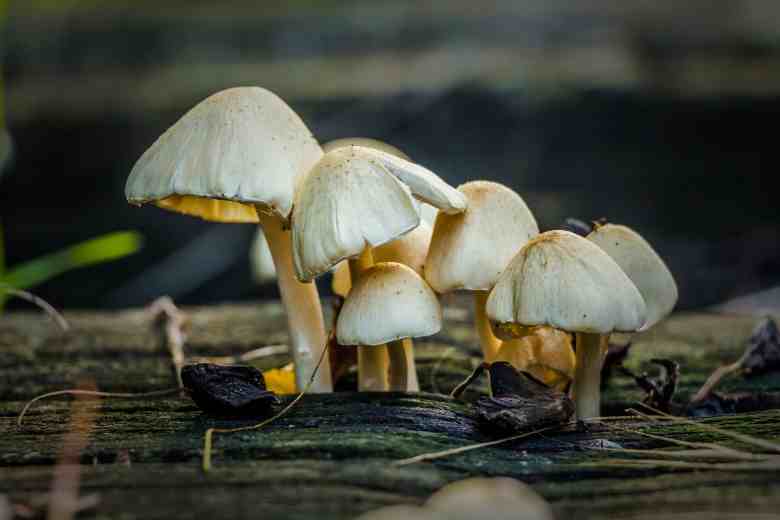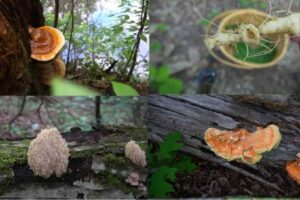
Mushroom spores are incredibly resilient organisms that have the potential to survive in some of the harshest conditions known to exist.
A particularly interesting question is whether or not mushroom spores can survive in space, and fortunately, the answer is yes. Numerous experiments have conclusively demonstrated that spores from various species of mushrooms are capable of surviving in the vacuum of space.
Additionally, spores exposed to the radiation and extreme temperatures of space have been known to germinate upon their return to Earth. This has led to the speculation that spores could potentially spread to other planets and even other galaxies, making mushroom spores one of the most resilient lifeforms in the universe.
Overview of Mushroom Spores
Mushroom spores are the tiny, reproductive agents of some species of fungi. They are responsible for the growth and spread of the fungus, and are essential to the successful cultivation of edible mushrooms.
Mushroom spores are created through asexual means, meaning that they do not require two parents to create a spore. They have a variety of shapes and sizes, and range from very small to visible to the naked eye.
The most common type of mushroom spores are basidiospores, produced by the basidia of the mushroom. The basidiospores are then released into the environment, and can be used to propagate the mushroom species in a variety of ways.
Mushroom spores are an essential part of the mushroom life cycle, and learning about the diversity of the mushroom world is a fascinating process.
Space Exploration and Mushroom Spores
The relationship between space exploration and mushroom spores is a multifaceted and intriguing one. From considering the potential for life on other planets to using fungi for life support systems in space, there are numerous aspects to consider. Here’s an overview of some of the ways in which space exploration and mushroom spores intersect:
-
Survivability of Spores in Space:
- Mushroom spores are extremely resilient and can survive in hostile environments. Studies have shown that some spores can endure the harsh vacuum and radiation of space for extended periods.
- This robustness leads to the panspermia hypothesis, which suggests that life, in the form of resistant spores, could travel between planets and potentially seed life elsewhere in the universe.
-
Astrobiology and Extraterrestrial Life:
- If mushroom spores or similar microorganisms can survive the journey through space, it raises questions about the potential for life (as we know it) to exist elsewhere in our solar system or even in other star systems.
- Experiments on space missions, like those on the International Space Station, sometimes involve exposing biological samples to space conditions to understand their survivability.
-
Bioregenerative Life Support Systems:
- Mushrooms, or fungi in general, have been considered as part of bioregenerative life support systems for long-duration space missions or for future lunar or Martian bases.
- Certain fungi can break down waste products and recycle them, making them potentially useful for closed-loop systems in space where resources are limited. They can help in breaking down organic waste and converting it into edible biomass or even into building materials.
-
Health and Nutrition in Space:
- Mushrooms are nutrient-dense and could be a valuable food source for astronauts on long missions. Growing edible fungi in space might provide necessary vitamins and minerals.
- Beyond nutrition, certain mushrooms have medicinal properties that could be beneficial in space, where the usual medical facilities are not available.
-
Mycelium as Building Material:
- The underground network of fungi, known as mycelium, is being researched as a potential building material. Its ability to grow and self-repair makes it an interesting option for constructing habitats in places like Mars.
- Mycelium can be combined with other materials to create durable and sustainable structures, potentially reducing the need to transport heavy building materials from Earth to other planets.
-
Mushrooms and Radiation:
- Some fungi are known to thrive in radiation-rich environments, such as the contaminated areas around the Chernobyl nuclear reactor. Understanding how these fungi interact with radiation could have implications for protecting astronauts from cosmic and solar radiation.
-
Ethical and Philosophical Considerations:
- If mushroom spores can survive in space and potentially colonize other planets, it raises ethical questions about our responsibility as humans introducing Earth life to extraterrestrial environments.
As space exploration continues to advance, the role of biology and, in particular, the unique properties of fungi and their spores, will likely become even more significant. These tiny organisms might play a crucial role in humanity’s venture into the cosmos.
Challenges of Spore Survival in Space
The challenges of staying alive in the hostile environment of space are numerous and unpredictable. From extreme temperatures to zero gravity and the vacuum of airless space, the challenge of surviving in space is daunting.
Microorganisms, such as the spore, are particularly vulnerable, as they are unable to respond to environmental changes. In order to survive in space, spores must possess certain adaptations that allow them to cope with the changing conditions.
This includes the ability to resist radiation, to withstand extreme temperatures and to handle the lack of oxygen. Each of these adaptations presents a unique survival challenge to the spore, requiring it to be able to respond quickly to changing conditions in order to survive.
With all of the obstacles, it’s hard to imagine how a spore can survive in the harsh environment of space, but with the right adaptations they can.
Potential Benefits of Using Mushroom Spores in Space Exploration
Mushroom spores are becoming increasingly popular within the space exploration community. The potential benefits of using mushroom spores to explore space are unparalleled.
The unique properties of mushroom spores can help protect astronauts from the hazardous environment of space, while providing an efficient way to harvest resources needed to support human life. Mushroom spores are also incredibly resilient, able to survive in the most extreme conditions, and can be used to help create a stable food source.
Additionally, mushroom spores can help to reduce the weight and bulk of spacecrafts, making them more efficient and cost-effective.
Finally, mushroom spores have the potential to provide much-needed nutrients to astronauts during long-term missions, ensuring that they have the necessary energy needed to explore and discover the unknown.
With all of the potential benefits of using mushroom spores in space exploration, it’s no wonder they are quickly becoming a must-have for any mission.
Possibility of Mushroom Spores Surviving in Space
The possibility of mushroom spores surviving in space has been a topic of debate for decades. Recent research has suggested that certain species of mushroom spores, such as those from the Coprinus cinereus family, are able to survive in space for extended periods of time.
This suggests that spores from these species are able to resist the harsh environment of space, and may even be able to colonize new planets.
The implications of this research are far-reaching, as scientists are now closer to understanding how life itself may have originated in outer space.
As this research continues to progress, we may soon have the answers to some of the universe’s most intriguing mysteries.
FAQ
Can mushroom spores survive in space?
Answer: Yes, mushroom spores are able to survive in space for long periods of time. They have been observed to remain viable even after exposure to the vacuum and extreme temperatures of space.
How long can mushroom spores survive in space?
Answer: Mushroom spores have been observed to remain viable for up to 2 years in space.
What type of environment do mushroom spores need to survive in space?
Answer: Mushroom spores need to be able to withstand the vacuum and extreme temperatures of outer space in order to survive. They also need to be protected from radiation and other space debris.
Conclusion
Overall, the research shows that mushroom spores are capable of surviving the extreme conditions of space. Studies have found that some spores are able to survive temperatures of up to -200 degrees Celsius, vacuum, and radiation, and even travel long distances through space. While the spores may survive, it is still unclear if the spores can actually germinate and grow in space. Future research that explores the viability of mushroom spores in space could reveal more about the potential of this organism in space exploration.






